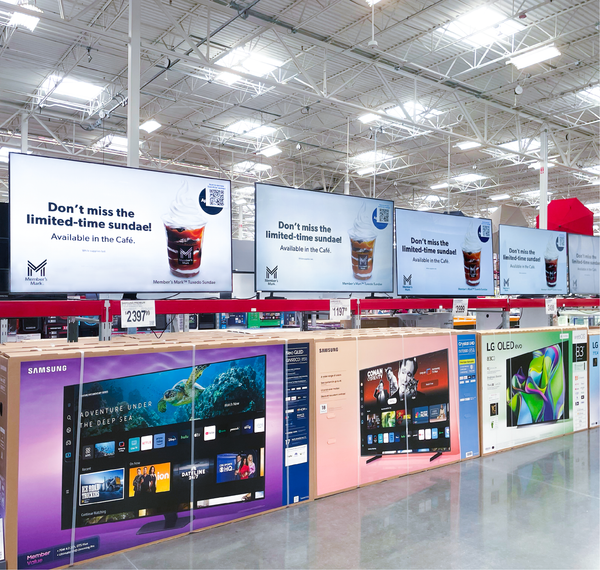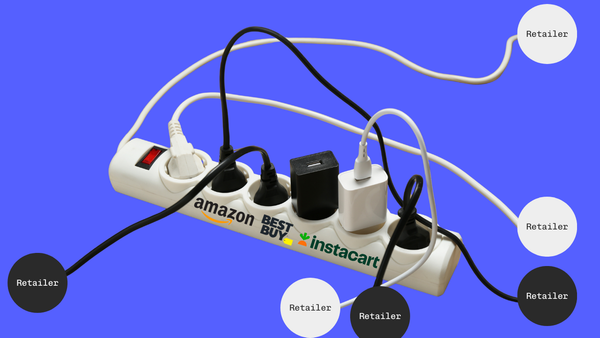My top 6 highlights from the new 'Retailgentic' podcast
The agentic AI wave is coming at blistering speed. Waiting on the sidelines is no safer than it was when retail marketplaces first appeared.

If you blinked, you probably missed it. We're already Googling less and ChatGPT-ing more. Shopping is next. Very soon the first place a consumer says "find me a birthday gift for my sneaker-obsessed nephew" won't be a search box or even a retailer website. It will be an AI agent that ricochets through every corner of commerce.
This shift creates three critical challenges:
- Brands have to figure out how to surface themselves in an algorithmic discovery layer they don't fully control
- Retailers have to decide which LLMs they invite into their hen house and on what terms, or risk becoming a mere fulfillment node in somebody else's ecosystem
- Retail media networks face the possibility that high-margin sponsored product ad slots could essentially vanish when a language model, not a human eyeball, becomes the interface
I've been writing and podcasting on these topics for a while, but I was thrilled to see a new newsletter and podcast entirely dedicated to this space from Scot Wingo.
As a disclaimer, I'm an advisor to ReFiBuy, Scot's new venture in this area. I've been devouring the content, and while I recommend you read the newsletter and listen to the podcast directly, I want to share my personal highlights and aha moments from the series so far.
1. How Early Is Too Early?
The agentic AI wave is coming at blistering speed. Waiting on the sidelines is no safer than it was when retail marketplaces first appeared. The only real decision is whether you want to ride the curve or be flattened by it.
Scot's direct experience founding ChannelAdvisor back in 2001 really informs his perspective here:
"This AI curve that we're on is faster than anything we've ever been on. It's gonna happen on a logarithmic scale, which many humans aren't really prepared for and most businesses aren't prepared for. This presents both a strategic risk—I do think this is gonna be an existential risk, just like Amazon/marketplaces has been for a lot of retailers. Some didn't make it to the other side of that... But I do think it's an opportunity as well. What we learned from that big wave of marketplaces is the folks that embraced it and rode the wave tended to do better than those that fought it."
What we've seen so far is that retailers have taken different stances toward agentic shopping. Amazon is building its own walled garden and preventing AI agents and bots from accessing it, while Walmart is open to an agent-to-agent pathway. If you're asking whether it's too early, history suggests the party is already in full swing.
2. Agents Could Be an Existential Threat to Retailers
Before building any roadmap, retail leaders need to choose their religion around agentic AI. Are agentic systems a partner, a channel, or a parasite? The stakes run from lost loyalty data to outright disintermediation.
As Scot puts it:
"That's almost theology at that level. As a company, you need to start thinking about this. What is your theology on this issue? The second one is: Is this a new channel that's forming like a marketplace? Is this an opportunity or is it risk? Is this something coming between you and the customer that will make you basically just a fulfillment center for whatever engine up top—for OpenAI or something like that?"
This thought experiment becomes really concrete when agents ask for loyalty data in exchange for better prices. Scot painted a scenario where an agent visits your website and you ask about the user, but the agent says the user prefers to be anonymous. Then you ask if they've transacted before, and maybe the agent goes back to negotiate: give me their loyalty number and I'll give you better pricing.
If bots, not humans, start to dominate traffic, the revenue model behind retail media networks could start to erode.
3. Agentic Payments and New Checkout Rails
Usage of LLMs for shopping research is surging, but most shoppers are still stuck in research mode. We're not really at the point yet where people are taking that final step of exchanging money.
"Once people get into this commercial bucket—I'm looking to buy something—then how many make it to the research phase, and then how many make it into the find and then the buy phase. Today we're basically at zero on buy, but the top part is getting big very quickly... People are really moving a lot of their shopping behavior to the LLMs because it is a much better research experience. Research new products is up to 48% now of usage, especially on Gemini."
Michelle Grant, Director of Strategy and Insights for Retail and Consumer Goods at Salesforce, shared insights from recent Salesforce research about consumer habits around AI. She noted that consumers want "the ability to turn it off and on easily, and then approval for any purchase. It's cool, but I don't think people are really ready to completely outsource their shopping without any sort of input."
Scot observed that many new wallets have a consumer-facing piece where the agent has a budget, and you can set a flag to check off on everything before spending. "It'll be interesting to see how long we go before people get comfortable enough that they start to take those rails off."
But just like in the early days of e-commerce, the payment system is going to be a fundamental piece of this puzzle.
4. An Existential Threat to Retail Media Networks
If half of traffic soon comes from bots, ad buyers won't pay for impressions that no human sees, which will force retail media to reinvent itself.
"If it's not humans and it's bots coming, an advertiser's not gonna want to pay for a bot to see an ad because it's gonna be basically blind to that. Certainly not influenced by it."
A conversation on the Retailgentic podcast with Sucharita Kodali, retail industry analyst at Forrester, proved really insightful here.
She noted that much of retail media originated with Amazon, and that colours how retailers think about retail media today. She argues that a lot of the effort to drive retail media investment came from marketing agencies.
"And I think that for retailers, there's a perception that it's easy money, that all they need to do is hang up a shingle with their ad network and call it whatever they call it, and they can get a part of that pie."
The biggest existential threat seems to be for sponsored product ads and ads shown onsite on a retailer's website. Offsite retail media opportunities still seem very relevant. And of course, we haven't even started talking about how ads are going to show up in the LLMs and agent interfaces themselves.
5. The 5 stages of AI automation
A post from this week on the Retailgentic blog plots a framework of how to think about the relative maturity level of different platforms – where they stand today and where they're headed.
The path follows 5 stages: research → find → buy → receive → replenish.

Currently, no platform has reached Levels 4 or 5. The most advanced offerings today are Amazon's "Buy for me" and Perplexity's "Buy with Pro" at Level 3.

The framework provides a clear roadmap for the industry and helps stakeholders understand exactly where we are in this transformation—and how far we still have to go before AI agents can truly handle end-to-end shopping autonomously.
5. The Future of Retail Websites
In an agentic world, there's a debate about whether websites will become obsolete or merely fancy product data catalogs. Michelle Grant from Salesforce offered a thoughtful perspective:
"I'm hesitant to say that everything is gonna be done through one of these agents, that we're all going to just shop on ChatGPT. Certainly not in the near term. I also like to remind people that shopping for many is like a leisure activity. It's a fun activity... when it comes to beauty or fashion, it's personal style. Scrolling multiple websites is not a pain for some people. It's fun."
She envisions websites staying but evolving: "When I go to Sephora and I'm logged in with my loyalty program, they're able in real time to really personalize it. Like these are the categories that I shop, these are the brands that I shop... My vision of the website is that it stays, there are product catalogs, heavy on content, really interactive, hyper-personalized experiences."
Websites won't die. They'll either level up into intelligent brand portals that delight humans who still browse, or fade into rich data hubs.
The Bottom Line
The agentic AI revolution in commerce isn't coming—it's here. The question isn't whether this transformation will happen, but whether your organization will be prepared for it. As Scot's experience with the marketplace revolution taught us, the companies that thrive are those that embrace the wave rather than fight it.
For more insights like these, I highly recommend checking out the Retailgentic newsletter and podcast directly. The depth of analysis and industry perspective Scot brings to this rapidly evolving space is invaluable for anyone trying to navigate the future of commerce.
Read my other posts on this topic:





